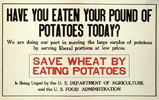2. WWI: Citizens as Rational and Regional









 more images below
more images below
In his plans for the U.S. Food Administration, Woodrow Wilson emphasized public volunteerism, or the “willingness” of democracy. He recognized a nation that revered the efficiency of business and a libertarian spirit.
“The successful conduct of the food administration... will be the finest possible demonstration of the willingness, the ability, and the efficiency of democracy, and of its justified reliance upon the freedom of individual initiative.”
— President Woodrow Wilson, announcing Herbert Hoover as Food Administrator, May 19, 1917. 3Before 1917 the US government had been hesitant to interfere in “the freedom of individual initiative” or in the economic matters of private business. Some members of Congress strongly objected to granting unprecedented power to war agencies like the Food Administration, even when the public supported it.
Wilson sought to grant the Food Administration the power to control food supplies, distribution and pricing. The president's opponents feared control over profits and a “revamping of the economic order” of the country. Supporters pointed to the “oppressive price of food” and “the violence of starving thousands” in Europe. 4
Voluntary rationing seemed like the best and only realistic approach for a government hesitant to expand its powers and for a public believed to be comprised of rational, cooperative individuals.
The “reason-why” style of advertising, which used convincing prose to rationalize a smart purchase, served as a model for many war messages. 5 Consequently, WWI posters were careful to explain, often with highly rational detail, why wartime cooperation and voluntary behavior changes were necessary.
“Our effort was educational and informative throughout, for we had such confidence in our case as to feel that no other argument was needed than the simple, straightforward presentation of facts.”
— George Creel, former Chairman of the Committee on Public Information, from his 1920 memoir, How We Advertised America. 6The U.S. Food Administration consulted with modern home economists to help establish guidelines for the homefront. The economists recommended “wheatless” and “meatless” days, believing that “if Americans could be taught about interchangeability of proteins, fats, and carbohydrates,” they could be persuaded to adopt the concept of substitution. 9
“Eat more cottage cheese. You'll need less meat.”
“Eat more corn. Palatable and nutritious in itself.”
“Have you eaten your pound of potatoes today? Save wheat by eating potatoes.”
— texts from USDA posters, 1917.Matter-of-fact suggestions about food substitutions and what to eat, while scientifically sound, disregarded the emotional and cultural influences behind most food choices. They were created in an age “that assumed an automatic connection between accurate data and rational action.” 7
Eager to appear less like a food dictator and more like a respected administrator Herbert Hoover conscientiously disseminated the Food Administration's information to regional offices and agencies.
“The food problem is one of wise administration and not expressed by the words ‘dictator’ or ‘controller,’ but by food administrator.”
— The first principle of food administration, outlined by Herbert Hoover after he was appointed Food Administrator, May 20, 1917. 8Hoover encouraged citizen cooperation on local, more personal levels than his newly formed federal agency could achieve. The Education Division of the Food Administration provided educational materials and core messages which regional offices could distribute to local organizations, schools, libraries, post offices and churches.
States interpreted the Food Administration's messages and produced their own posters, often including strident wording Hoover would have avoided. An Arizona state poster told citizens, “The German government would make you feed yourself. Uncle Sam wants you to feed yourself,” while one from Kansas explained, “Personal sacrifice must supplant previous extravagance... Waste of food is disloyalty.”
Image Gallery |
Next Section










